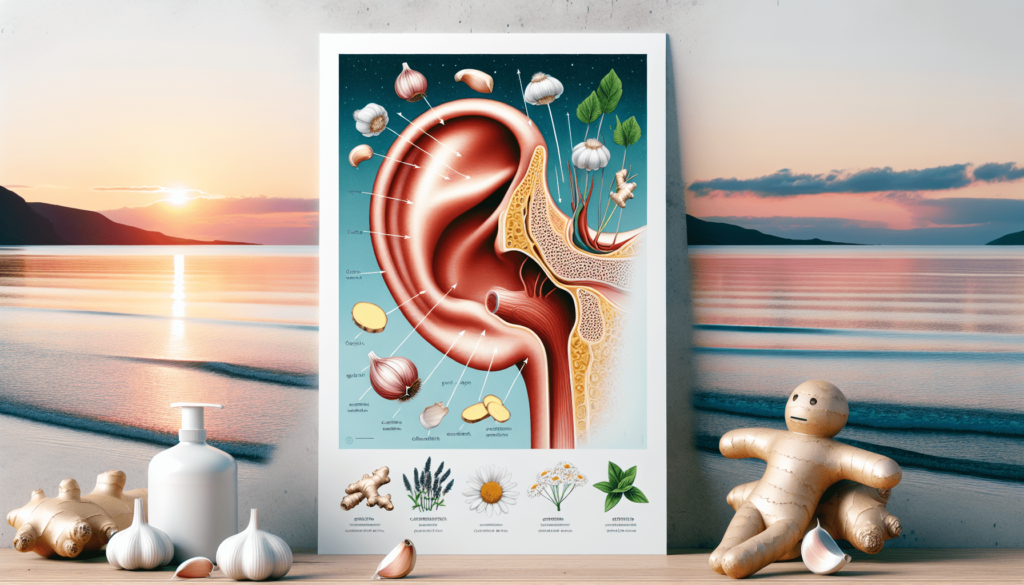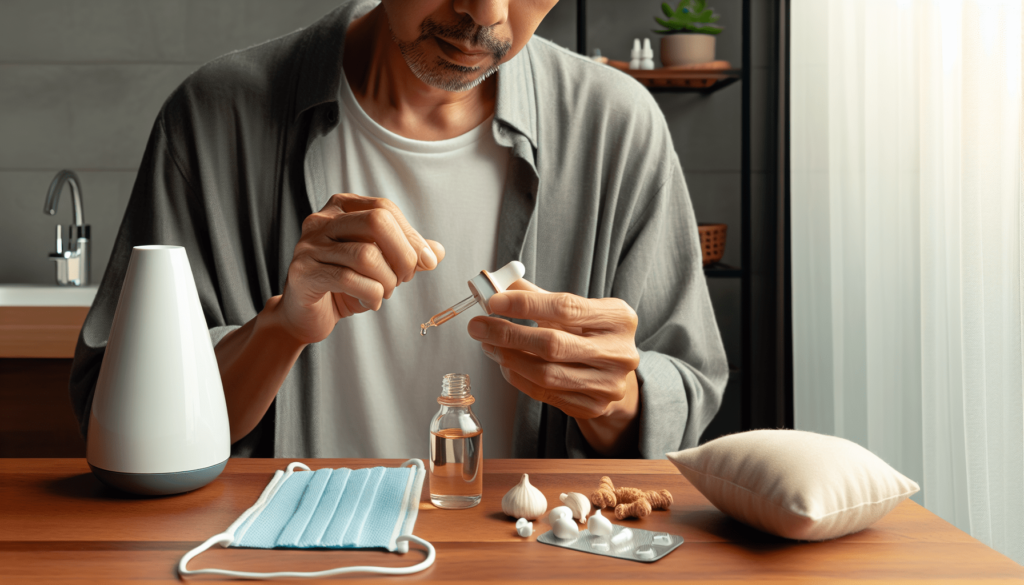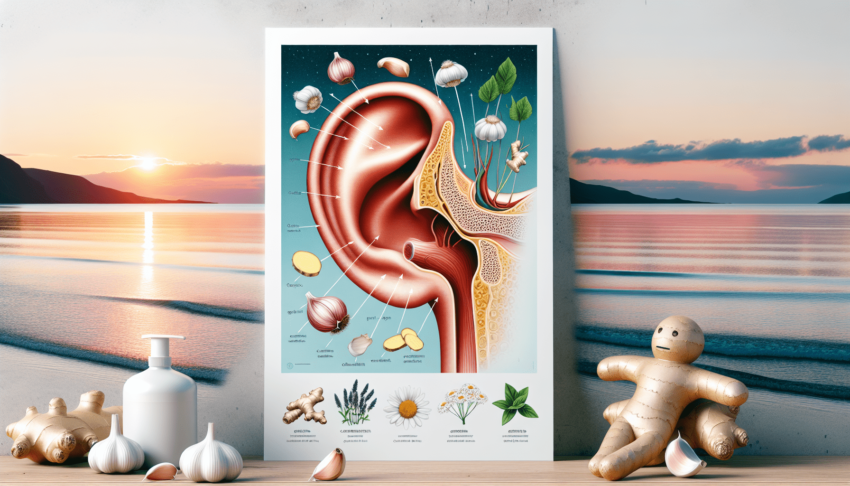If you’ve ever experienced the discomfort of an ear infection, you know how it can make even the simplest tasks feel like a challenge. The throbbing pain, reduced hearing, and overall unease can be quite overwhelming. But what if there was a way to alleviate these symptoms without relying on antibiotics? In this article, we will explore some effective home remedies that can help ease the discomfort and promote healing without the use of medication. So, if you’re looking for natural ways to find relief from ear infection symptoms, keep reading!
Natural remedies for ear infection
Ear infections can be incredibly uncomfortable and can disrupt your daily activities. If you’re looking for natural remedies to alleviate the symptoms of an ear infection, look no further! Here are a few tried and tested remedies that you can easily try at home.
Garlic oil
Garlic is well-known for its antibacterial and antiviral properties, making it a great remedy for ear infections. To make garlic oil at home, all you need is some fresh garlic cloves and olive oil. Crush a few cloves of garlic and mix them with olive oil. Heat the mixture gently and let it cool down. Once it’s cool, strain out the garlic and pour a few drops of the oil into the affected ear. Garlic oil can help relieve pain and reduce inflammation.
Warm compress
A warm compress can provide instant relief from the pain and discomfort caused by an ear infection. Simply soak a clean washcloth in warm water, wring out the excess, and hold it against the affected ear. The warmth will help soothe the inflammation and promote drainage of the built-up fluid in the ear. Remember, the compress should be warm, not hot, to avoid burning yourself.
Apple cider vinegar
Apple cider vinegar has natural antimicrobial properties that can help fight off the infection-causing bacteria in the ear. Mix equal parts of apple cider vinegar and water, and use a clean dropper to put a few drops of the mixture in the affected ear. Let it sit for a few minutes, then tilt your head to drain out the liquid. The acidity of apple cider vinegar helps create an unfavorable environment for bacteria to thrive and can aid in relieving the symptoms of an ear infection.
Warm onion juice
While it may sound unconventional, warm onion juice can be an effective natural remedy for ear infections. Onions have natural anti-inflammatory properties, which can help reduce the swelling and pain associated with an ear infection. To prepare the warm onion juice, finely chop a medium-sized onion and heat it in a pan with a little water. Once the mixture is warm, strain out the onion and use a dropper to put a few drops of the juice into the affected ear. Leave it in for a few minutes and then tilt your head to let it drain.
Breast milk
Breast milk isn’t just for babies! It turns out that breast milk contains antibodies and antimicrobial properties that can help fight off infections, including those in the ear. If you’re a breastfeeding mother, express a few drops of breast milk and use a clean dropper to put it in the affected ear. Repeat this a few times a day, and you may find that it helps alleviate the symptoms of an ear infection.
Over-the-counter pain relievers
In addition to natural remedies, over-the-counter pain relievers can also provide temporary relief from the symptoms of an ear infection. Two commonly used pain relievers for this purpose are acetaminophen and ibuprofen.
Acetaminophen
Acetaminophen, also known as paracetamol, is a commonly used pain reliever that can help reduce ear pain. It works by blocking certain chemicals in the body that signal pain. Make sure to follow the dosage instructions on the packaging and consult a healthcare professional if you have any concerns.
Ibuprofen
Ibuprofen is another pain reliever that can help alleviate the discomfort associated with an ear infection. It not only helps reduce pain but also has anti-inflammatory properties that can help reduce swelling. As with any medication, it’s important to follow the recommended dosage and consult a healthcare professional if needed.

Nasal irrigation
Nasal irrigation can help clear out any congestion or blockages in the nasal passages, which can indirectly relieve the symptoms of an ear infection. Two common methods of nasal irrigation are using a neti pot or saline nasal sprays.
Neti pot
A neti pot is a small container designed specifically for nasal irrigation. Fill the neti pot with a saline solution, which can easily be made at home by mixing non-iodized salt and warm water. Lean over a sink and tilt your head to one side, then pour the saline solution into one nostril, allowing it to flow through the nasal cavity and out through the other nostril. This process can help flush out any irritants or excess mucus that may be contributing to your ear infection.
Saline nasal sprays
If you don’t have a neti pot, saline nasal sprays can also be used to irrigate the nasal passages. These sprays contain a saline solution and can be sprayed into each nostril to help clear out congestion and moisturize the nasal passages. They are readily available at most pharmacies and can provide temporary relief from the symptoms of an ear infection.
Stay hydrated
Drinking an adequate amount of water can play a significant role in promoting the overall health and well-being of your body, including your ears. Staying hydrated helps thin the mucus in your respiratory system, preventing it from becoming too thick and clogging your eustachian tubes. Proper hydration can also support your immune system, enabling it to fight off infections more effectively.

Rest and sleep
When you’re dealing with an ear infection, getting enough rest and sleep is crucial for your body’s healing process. Resting allows your immune system to focus on fighting off the infection, while sleep promotes overall healing and rejuvenation. Make sure to prioritize rest and aim for at least 7-8 hours of uninterrupted sleep every night.
Keep the affected ear elevated
Keeping the affected ear elevated can help reduce the pressure and pain associated with an ear infection. Prop yourself up with an extra pillow while lying down, or use cushions to elevate your head slightly while sitting or reclining. This position can promote better drainage and relieve some of the discomfort you may be experiencing.

Avoid irritants
To aid in the healing process and prevent further irritation, it’s important to avoid certain irritants that can aggravate an ear infection. Two common irritants to steer clear of are smoke and excessive noise.
Smoke
Cigarette smoke and other forms of smoke can irritate the delicate tissues in your ears and prolong the healing process. If you’re a smoker, it’s best to refrain from smoking until the infection has cleared up. Additionally, try to avoid secondhand smoke as much as possible, as it can also worsen the symptoms of an ear infection.
Excessive noise
Loud noises can cause discomfort and put strain on your ears, making an ear infection feel even worse. When dealing with an ear infection, try to stay away from loud environments or use earplugs or earmuffs to protect your ears from excessive noise. Resting in a quiet and peaceful environment can greatly aid in the healing process.
Use a humidifier
Dry air can irritate your respiratory system, including your ears, and make the symptoms of an ear infection feel more pronounced. Using a humidifier in your home can help add moisture to the air and prevent dryness. This is particularly beneficial in the winter months when the air tends to be drier. Keep the humidity level around 40-50% for optimal comfort.

Avoid inserting objects in the ear
One of the most important things you can do to avoid further damage and promote healing is to avoid inserting any objects into your ear. This includes cotton swabs, bobby pins, or any other sharp or pointed objects. Attempting to clean your ears in this way can push the wax or any other debris further into the ear canal, worsening the infection and potentially causing injury. Stick to external cleaning of your ears and consult a healthcare professional if you have excessive earwax or any concerns.
Consult a healthcare professional
While natural remedies can be incredibly helpful in relieving the symptoms of an ear infection, it’s important to remember that they may not always be sufficient. If your symptoms persist or worsen despite trying these remedies, it’s crucial to consult a healthcare professional for a proper diagnosis and appropriate treatment. They will be able to assess your condition, prescribe antibiotics if necessary, and provide personalized advice to help you recover as quickly as possible.
In conclusion, while ear infections can be uncomfortable, there are several natural remedies and self-care practices that can help provide relief. From garlic oil and warm compresses to over-the-counter pain relievers and nasal irrigation, these remedies can effectively alleviate symptoms and support the healing process. Remember to prioritize rest, stay hydrated, and consult a healthcare professional if needed. With the right care and attention, you’ll be back to enjoying life without the discomfort of an ear infection.



